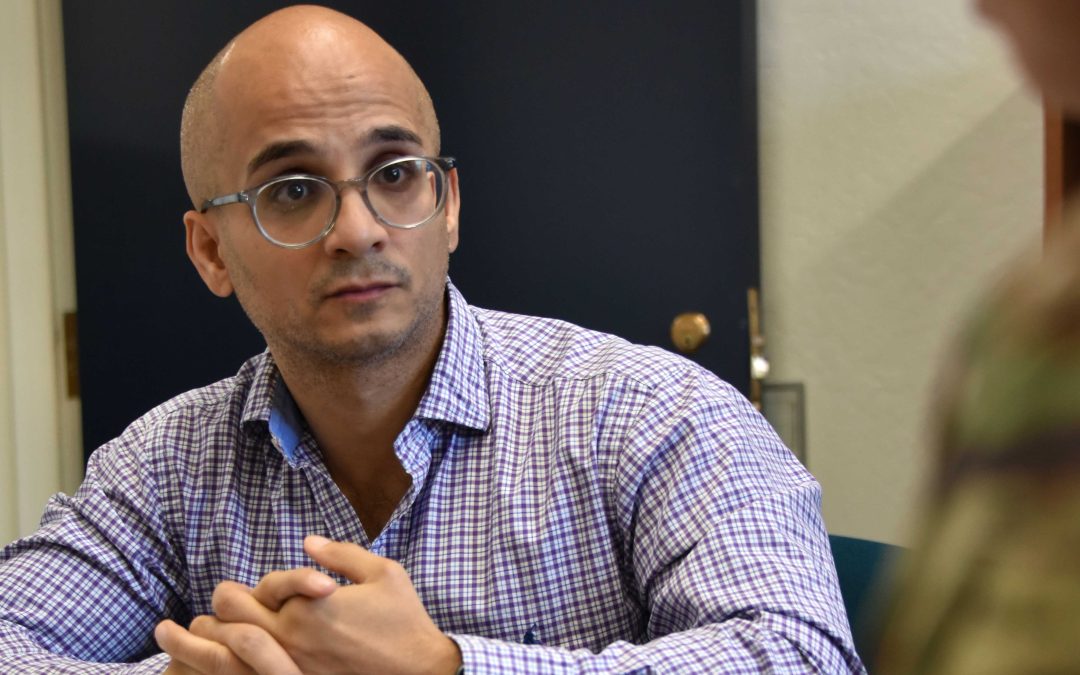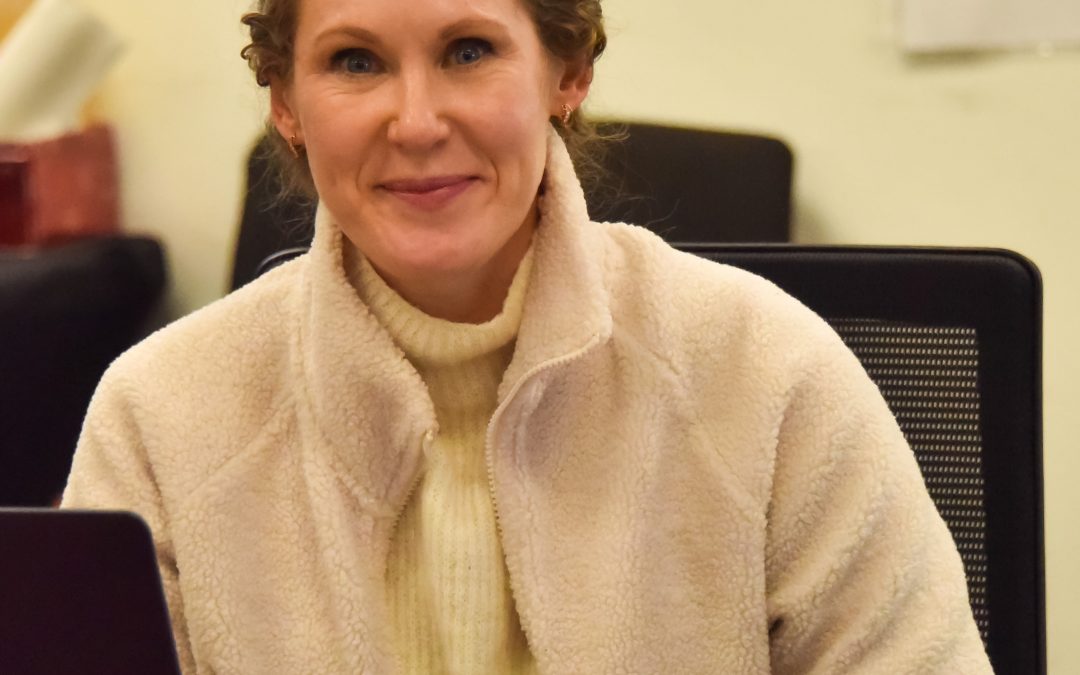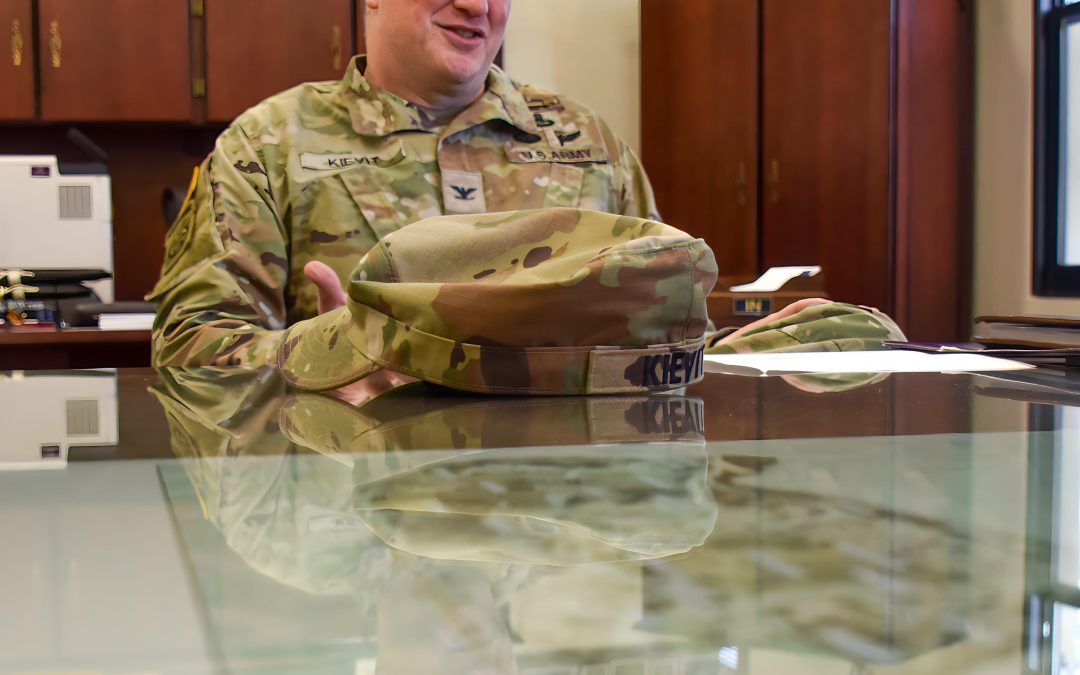By Natela Cutter
DLIFLC Public Affairs
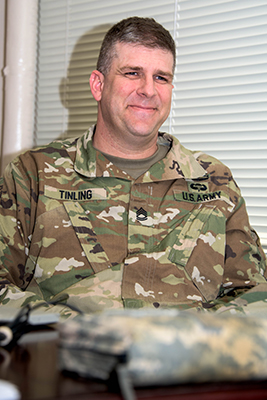
Today, as the Chief Military Language Instructor at Middle East III, Sgt. First Class Brandon Tinling runs, together with the civilian leadership, a school of about 100 teachers, eight Military Language Instructors, and several hundred students of all four branches of the service. (U.S. Army photo by Amber K. Whittington)
MONTEREY, Calif. – When Sgt. First Class Brandon Tinling graduated from his Modern Standard Arabic course about 15 years ago, he didn’t exactly know what lay ahead for him. He thought he may end up working in a cubicle, diligently chipping away at Arabic translations and analysis. Instead, he ended up deploying four times.
“One day in Baghdad, while I was sitting outside on my break, one of the gate guards came running up to me to take me back over to the gate where a frantic Iraqi woman was screaming and crying. I quickly found out that her daughter had been kidnapped earlier in the day. We were able to pass that information on to the Iraqi police and they were able to find the child within 24 hours,” said Tinling.
Today, as the Chief Military Language Instructor at Middle East III, Tinling runs, together with the civilian leadership, a school of about 100 teachers, eight Military Language Instructors, and several hundred students of all four branches of the service. The kidnapping in Baghdad took place just a year after his graduation in 2004, and is one of the favorite stories he tells students because it illustrates how knowledge of a foreign language saves lives.
“The role of MLIs is vital at Defense Language Institute because we have been out in the field and we know what awaits these young men and women when they get out there,” explained Tinling, speaking about the mentorship role MLIs play in the schoolhouse, in addition to teaching some 10 hours per week, grading papers, tracking test results, and counseling students regarding academic and nonacademic performance.
In 2015, with the arrival of a new Commandant to the Defense Language Institute Foreign Language Center, the Institute began laying plans in earnest to achieve higher levels of student proficiency and set the graduation standard for 2+ in listening, 2+ and reading, and 2 for speaking, according to the Interagency Language Roundtable scale. But this change needed to be followed up with an actionable plan within the eight DLIFLC schools.
“My decision to ask the MLIs in each of the schools to work closely with their civilian counterparts on a realistic plan to achieve 2+ levels, precisely came from the fact that I knew MLIs had military planning skills, as well as knowledge about what the students need to reach those goals. Motivating the students is also no small part of the process, in fact, it may be the most important,” said DLIFLC Commandant Col. Phil Deppert.
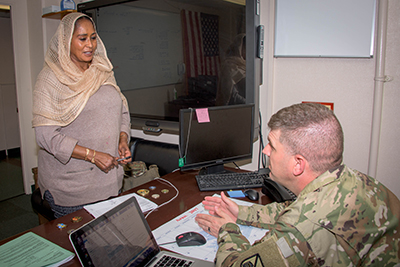
Today, as the Chief Military Language Instructor at Middle East III, Sgt. First Class Brandon Tinling runs, together with the civilian leadership, a school of about 100 teachers, eight Military Language Instructors, and several hundred students of all four branches of the service. (U.S. Army photo by Amber K. Whittington)
Aside from helping the civilian deans and chair persons of the departments create a viable plan and execution timeline for the 2+ plan, Tinling decided to strengthen the MLI mentorship program by having them volunteer their time outside of the classroom to spend with students, responding to their questions and motivating them to want to reach higher levels of proficiency.
“The push for 2+ is strategically and tactically great and it is one of the reasons why we have pushed so hard to motivate students and give them a lot of other skills needed to be successful. There are things outside of the curricula, such as critical thinking skills, briefing skills, interaction with people and using the language in authentic settings which can help them,” he said.
“The MLIs have such a vast background of knowledge and experiences of duty assignments that they have a unique chance to present all those job opportunities to the students… and explain what they will be doing, from a tactical standpoint with a platoon, right up to the national and strategic level,” explained Tinling, in-between talking to a Marine Corps sergeant and an Arabic language instructor.
“This is a very academic environment, but once we release our students into the force it’s no longer an academic exercise, it’s a very practical and very real exercise,” said Tinling.
As for his own motivation, Tinling says, “The more I teach and share, the greater, and longer lasting my impact on the military in general, and on individual Soldiers. The students I teach and mentor now will be my legacy long after I have retired.”

Today, as the Chief Military Language Instructor at Middle East III, Sgt. First Class Brandon Tinling runs, together with the civilian leadership, a school of about 100 teachers, eight Military Language Instructors, and several hundred students of all four branches of the service. (U.S. Army photo by Amber K. Whittington)

